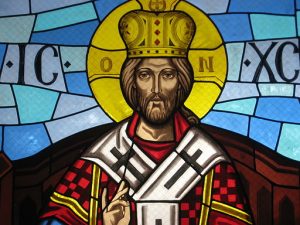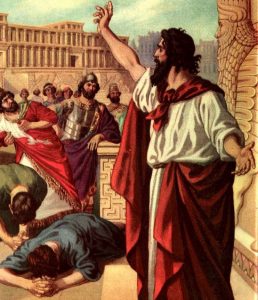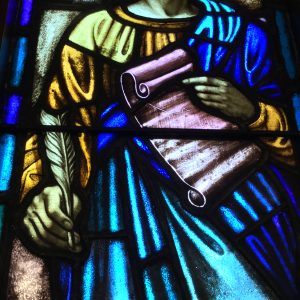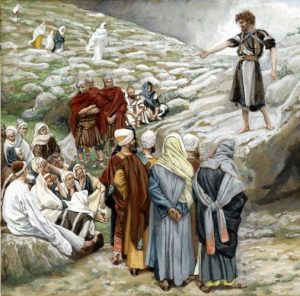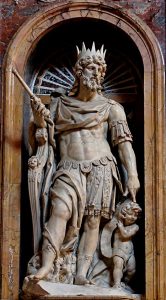…Pursue righteousness, godliness, faith, love, perseverance and gentleness. Fight the good fight of faith; take hold of the eternal life to which you were called. (1 Tim. 6:11-12)
When we think of eternal life, we usually think of life after death and forget that eternal life starts in the present, not just after we die.1 This idea is often discussed in Judaism — what it means to live in eternity here in the present, while in this world. When Jesus uses the term “eternal life,” he also sometimes refers to the present world, and if we read his words thinking about only heaven, we miss his point. Not only does this Jewish idea clarify our reading, but it gives us wisdom about how to live in the world today.
In the Talmud, from the first few hundred years after Christ, there are several references to the rabbinic concept of hayei olam (Hi-YAY Oh-LAHM), meaning eternal life.2 Often it was contrasted with hayei sha’ah (Hi-YAY Sha-AH), which means fleeting life, or earthly life. Usually they didn’t speak of one as before death and the other after death. Rather, hayei olam was “lasting life,” and it referred to living a life focused on matters of eternal importance: living now as if you were living for eternity. In contrast, hayei sha’ah was to living a life that is only concerned about the short term material needs of today: working, making money, eating, etc.
 The rabbis considered the study of Scripture one of the most important ways you could partake in eternity while on earth. A story is told about a rabbi who spent years in study of the Scriptures, and then walked past farmers tilling their land. He remarked, “they have abandoned lasting life (hayei olam) and involve themselves instead with fleeting life (hayei sha’ah).”3
The rabbis considered the study of Scripture one of the most important ways you could partake in eternity while on earth. A story is told about a rabbi who spent years in study of the Scriptures, and then walked past farmers tilling their land. He remarked, “they have abandoned lasting life (hayei olam) and involve themselves instead with fleeting life (hayei sha’ah).”3
The rabbis described a person who lives only for today as having “the soul of a cow.” Just as a cow stands all day long munching grass, only thinking about where the next mouthful will come from, this person focuses on daily cares and material things, not on eternal truths.
Jesus’ Words About Hayei Olam
Jesus mentions “eternal life” in the gospel of John, and he often appears to be thinking in terms of having a life in eternity here and now. For instance:
This is eternal life, that they may know you, the only true God, and Jesus Christ whom you have sent. (John 17:2)
Using a definition of life after death, this line doesn’t quite make sense. We may try to read it as, “We will have eternal life after we die if we know God and Jesus Christ.” However, if we hear its intent to focus on the present life, we understand that Jesus is saying that knowing God intimately and living with Jesus Christ as Lord, here and now, is living as if you were already in eternity. This makes a lot of sense — what thing in our lives has more eternal significance than that?
Jesus makes one comment about eternal life that makes little sense without a knowledge of his Jewish context. He critiques the Jewish idea that the study of Scriptures was the ultimate way to live out one’s “eternal life”:
You diligently study the Scriptures because you think that by them you possess eternal life. These are the Scriptures that testify about me, yet you refuse to come to me to have life. John 5:39-40
Jesus is speaking to some of his fellow Jews who did not see that the Scriptures ultimately pointed toward him. Eternal life is not had even in studying the Scriptures, but in finding in them that Jesus is our Lord, and we can know and serve him.
Paul’s Words About Life
Paul also spoke about hayei olam in Romans. He points out that just as Christ died and rose again into eternal life, if we partake in Christ’s death through baptism, we now have this eternal life as well. We have been brought from death into life, and this eternal life is very much in the present world:
We were therefore buried with him through baptism into death in order that, just as Christ was raised from the dead through the glory of the Father, we too may live a new life… For we know that since Christ was raised from the dead, he cannot die again; death no longer has mastery over him. The death he died, he died to sin once for all; but the life he lives, he lives to God. In the same way, count yourselves dead to sin but alive to God in Christ Jesus. Therefore do not let sin reign in your mortal body so that you obey its evil desires. Do not offer the parts of your body to sin, as instruments of wickedness, but rather offer yourselves to God, as those who have been brought from death to life; and offer the parts of your body to him as instruments of righteousness. (Romans 6:4, 6-13)
To Paul, if we now are living in our “eternal life” we should not let sin reign over us, but live the way God designed us to live. Just as Jesus now has eternal life, we have it too, here and now, and extending after we die. Paul exhorts us to “pursue righteousness, godliness, faith, love, perseverance and gentleness. Fight the good fight of faith; take hold of the eternal life to which you were called” (1 Tim 6:11-12). We need to take hold of our eternal lives and live them well now, not just wait for them in the future.
How Do We Live in Response?
This question was essentially what the rich young ruler said to Jesus: how can I acquire eternal life? (Luke 18:18-22). Our traditional reading assumes he is asking about eternal life after he dies. While we can’t be sure, it is interesting to read that story with the idea of hayei olam in mind.
 The man has read and obeyed the Scriptures, but Jesus sees that his wealth is what keeps him bound to hayei sha’ah, fleeting life, an empty life focused only on material gain. Jesus says that if he wants true life, he should give away the wealth that binds him, and follow after him as one of his disciples. Then he would have hayei olam, as in John 17:3, knowing Christ and the Father intimately in this life and for eternity. The ruler declines the offer, to Jesus’ sorrow. We should look at ourselves in the rich man too: are we so distracted by our material wealth that it keeps us living for what will not matter in eternity?
The man has read and obeyed the Scriptures, but Jesus sees that his wealth is what keeps him bound to hayei sha’ah, fleeting life, an empty life focused only on material gain. Jesus says that if he wants true life, he should give away the wealth that binds him, and follow after him as one of his disciples. Then he would have hayei olam, as in John 17:3, knowing Christ and the Father intimately in this life and for eternity. The ruler declines the offer, to Jesus’ sorrow. We should look at ourselves in the rich man too: are we so distracted by our material wealth that it keeps us living for what will not matter in eternity?
Jesus made another statement about wealth and eternity that can also give us direction for today. He says, “I tell you, use worldly wealth to gain friends for yourselves, so that when it is gone, you will be welcomed into eternal dwellings” (Luke 16:9). We are not obligated to give all our money away, but our focus should be to use it to invest in eternal things — sharing the gospel, deepening our relationships, and helping others in need.
We have Jesus’ blessing to spend our money extravagantly on things that will show God’s love. We should also look at how we spend our time — on ourselves? Or on God and others? Do we fill our extra time with mindless entertainment like TV, movies and video games? Or do the things we do invest in people who will live forever, like nurturing friendships, showing hospitality, raising children, and loving others? As Paul says,
For the one who sows to his own flesh will from the flesh reap corruption, but the one who sows to the Spirit will from the Spirit reap eternal life. Let us not lose heart in doing good, for in due time we will reap if we do not grow weary. So then, while we have opportunity, let us do good to all people, and especially to those who are of the household of the faith. (Galatians 6:8-10)
The Challenge of “Here and Now” Eternal Life
When we only think of eternal life as “going to heaven when you die,” and not a new life in this world, we can actually distort the gospel’s message. Sometimes the gospel is presented starting with the question, “Do you know what would happen if you died tonight?” And then the next statement is, “If you receive Christ, you can know where your eternity will be spent.”
If nothing else is added to this, the gospel becomes a hollow kind of “fire insurance” that has nothing to do with our lives, but is just concerned with what will happen after we die. It’s an easy thing to offer people, because their lives don’t need to change, and it is easier on us, too, because we can go on as shallow people of hayei sha’ah, living only for today.
In contrast, Jesus said, “I have come that they may have life, and have it to the full” (John 10:10). Following Christ is what gives our lives here eternal meaning and purpose. How can we forget to share that with people? The world is full of people who see no meaning in life here on earth. Perhaps we would have a stronger witness if we had obviously different lives, and we invited others to join us in investing our lives in eternity with Christ.
~~~~
1 See also “Salvation in this Life.”
2 These terms are found written down first in the Talmud, which dates from around 500 AD. Many oral traditions are recorded in it that come from Jesus’ time and before.
3 Quote is from the Babylonian Talmud, Shabbat 33b:7.
Photos: Elijah Hail on Unsplash, BKMD at English Wikipedia [CC BY-SA 3.0]








